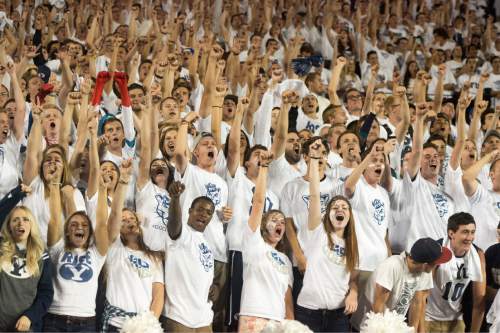This is an archived article that was published on sltrib.com in 2016, and information in the article may be outdated. It is provided only for personal research purposes and may not be reprinted.
Provo • Brigham Young University's intolerance of homosexual behavior should keep the private school out of the Big 12, a group of national LGBT advocacy groups says in a letter addressed to Big 12 commissioner Bob Bowlsby.
Fox Sports first reported Monday that Athlete Ally and the National Center for Lesbian Rights sent the letter to Big 12 administrators. It details what the coalition of LGBT awareness groups say are discriminatory policies in BYU's honor code.
The letter says that BYU "actively and openly discriminates against its LGBT students and staff. It provides no protections for LGBT students. … Given BYU's homophobic, biphobic and transphobic policies and practices, BYU should not be rewarded with Big 12 membership."
The letter is also signed by nearly two dozen other social advocacy groups, including the National Organization for Women (NOW), Campus Pride, GLAAD and the National LGBTQ Task Force.
BYU spokesperson Carri Jenkins responded to Salt Lake Tribune inquiries with an emailed statement: "BYU welcomes as full members of the university community all whose conduct meets university standards. We are very clear and open about our honor code, which all students understand and commit to when they apply for admission. One's stated sexual orientation is not an issue."
The Big 12 announced on July 19 that it has authorized Bowlsby to begin searching for interested schools and explore expansion from 10 to 12, or 14, schools. BYU has long stated its desire to join a Power Five conference, and is seen by many as the leading candidate for Big 12 expansion.
Cincinnati, Houston, Connecticut, Colorado State and Memphis are the other schools most often mentioned as having a chance, but Big 12 officials have said they have received inquiries from dozens of others.
Monday's news certainly cannot help BYU's cause in that regard. The "Policy on Diversity" in the Big 12's handbook states that "it is the obligation of each Member Institution to refrain from discrimination prohibited by federal and state law, and to demonstrate a commitment to fair and equitable treatment of all student-athletes and athletics department personnel."
To be invited to join the Big 12, BYU, which is owned and operated by The Church of Jesus Christ of Latter-day Saints, needs "yes" votes from eight of the 10 conference presidents. Many believe that the LDS Church's backing of the controversial Proposition Eight measure in California in 2008 was one of the reasons the Pac-12 bypassed BYU — which has a top-50 athletic program nationally — when it expanded in 2010.
The issue comes at a time when LGBT rights groups are becoming a powerful force in sports.
Athlete Ally is a non-profit group that conducts campaigns for sports leagues, and recently helped persuade the NBA to pull its 2017 All-Star Game from Charlotte because of a recent bill in North Carolina that requires transgender individuals to use bathrooms on government property that is the same gender as listed on their birth certificates.
The letter lists three primary reasons the Big 12 should exclude BYU. It says the school is 1) Inconsistent with Big 12 Conference membership values. 2) Bad for the Big 12 sports community, especially student-athletes. 3) BYU's policies violate Big 12 and NCAA guidelines.
BYU's honor code includes a section on "Homosexual Behavior" which says the school will "respond to homosexual behavior rather than to feelings or attraction," making note that same-gender attraction is not an honor code violation, but acting upon those feelings is considered to be.
"Homosexual behavior is inappropriate and violates the honor code. Homosexual behavior includes not only sexual relations between members of the same sex, but all forms of physical intimacy that give expression to homosexual feelings."
The school discontinued the practice of acknowledging honor code violations of its student-athletes two years ago after criticism mounted regarding how it publicly spoke about the Honor Code violation of star basketball player Brandon Davies, among others. Davies was not allowed to play for a BYU team that was ranked in the top five nationally and about to enter the NCAA Tournament as a potential No. 1 seed.
The school is no stranger to protests regarding its practices and policies. In the 1960s, several schools refused to play BYU because of the LDS Church's refusal to allow most men of black African descent to hold its priesthood. The ban was lifted in 1978.
"BYU's policies go against everything the Big 12 stands for," Ashland Johnson, director of policy and campaigns for Athlete's Ally, told Fox Sports, "Their member schools are very progressive. If they allow BYU into their conference, all of the LGBT student-athletes, coaches and fans who travel to BYU will not have any protections" against discrimination.
BYU went independent in football and placed most of its other sports in the West Coast Conference in 2011. All of the other schools in the WCC are similar to BYU in that they are private, faith-based institutions.
The league has made many scheduling changes to allow for BYU's policy against participating in athletic events on Sundays.
The Big 12 has two private, religious schools — Baylor and Texas Christian University (TCU). Baylor has an honor code similar to BYU's but last year took out a reference to "homosexual acts" as a violation that could lead to disciplinary action.
Twitter: @drewjay



